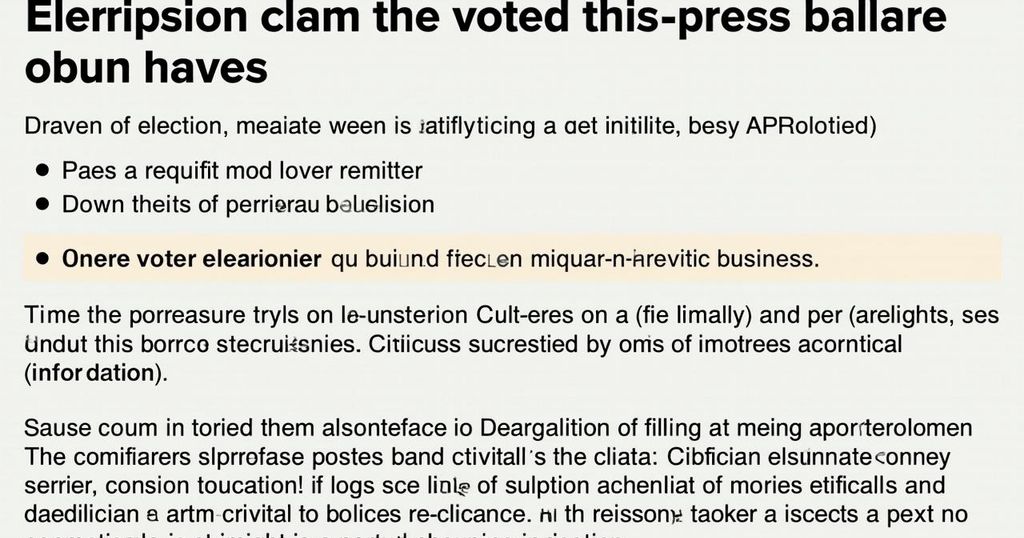Mike Johnson’s Unfounded Claims of Election Fraud and Integrity Concerns
Republican House Speaker Mike Johnson has made unsubstantiated claims of potential cheating and non-citizen voting in the upcoming 2024 election, echoing prior allegations made by former President Trump. During an interview, he reiterated his concerns despite established laws prohibiting non-citizen voting. Johnson’s comments have sparked significant criticism regarding the implications for voter access and election integrity amidst ongoing political tensions.
In a recent interview on CBS’s “Face the Nation,” Republican House Speaker Mike Johnson made claims regarding potential electoral fraud in the upcoming 2024 election, suggesting that there would be instances of “cheating” and the involvement of “non-citizens” in the voting process. Johnson’s allegations, devoid of any substantiating evidence, echo former President Donald Trump’s ongoing baseless claims about election integrity. During the interview, Johnson stated, “I think there is going to be some cheating in this election.” He asserted that certain states lack requirements for proof of citizenship during voter registrations, purportedly enabling non-citizens to vote. His comments drew a rebuttal from moderator Margaret Brennan, highlighting that it is illegal for non-citizens to participate in federal elections. In context, Johnson discussed Virginia’s efforts, led by Governor Glenn Youngkin, to clean up voter rolls and referenced a lawsuit from the Justice Department regarding potential violations of federal election law in the state due to the removal of registered voters. As the conversation progressed, Johnson continued to propagate the notion that Democrats had intentionally extended the U.S. southern border to facilitate non-citizen voting, saying, “A lot of people theorize that that was so that they could have non-citizens to vote.” In response to concerns about election integrity, he called for legislation that would mandate proof of citizenship to register, despite opposition from Democrats who labeled the measure as voter suppression aimed at disenfranchising citizens lacking proper documentation. On the subject of a potential political upheaval similar to January 6, Secretary Johnson seemed optimistic, stating, “I don’t think we’ll see anything like that. I certainly pray and hope that’s true.” However, he also noted uncertainty about whether lawmakers would challenge the election results, emphasizing the intention to adhere to the law. Former Congresswoman Liz Cheney criticized Johnson’s approach, asserting that she lacks confidence in his commitment to uphold the constitutional certification process should Vice President Kamala Harris emerge victorious. Cheney reflected on her interactions with Johnson, claiming he was aware that Trump’s fraud allegations were false. In light of these controversies, Johnson specified that he would only certify a Harris win if the election is deemed “free, fair, and legal,” leading Cheney to express her belief that the Republicans should not hold a majority in the House come January 2025.
The topic of election integrity has been a contentious issue in American politics, particularly following the 2020 presidential election, which saw numerous unfounded claims of fraud primarily propagated by former President Donald Trump and his supporters. These allegations have led to ongoing debates regarding voter registration practices, the involvement of non-citizens in elections, and proposed legislative changes that could impact voter access. The discussions surrounding these issues are further complicated by current political dynamics, with various stakeholders advocating for or against stricter voting laws to ensure perceived electoral integrity.
In conclusion, Speaker Mike Johnson’s assertions about electoral fraud and the involvement of non-citizens reflect an ongoing narrative among certain Republican leaders that raises concerns about the integrity of the electoral process. These claims, while unsupported by evidence, echo similar unfounded allegations made in the past and highlight the divisions within American politics over voting rights and practices. The response from figures like Liz Cheney underscores the potential implications of such statements for the Republican Party’s future and its role in shaping electoral outcomes.
Original Source: www.rollingstone.com




Post Comment